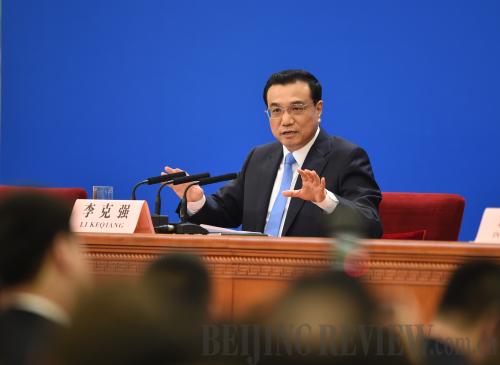|
 |
|
AUTHORITATIVE ANSWERS: Chinese Premier Li Keqiang speaks at a press conference in Beijing on March 15 (XIE HUANCHI) |
Premier Li Keqiang met the press on March 15 after the conclusion of this year's full session of the National People's Congress, China's top legislature. He answered questions on a wide range of domestic and international issues. Selected excerpts follow:
Government Reform
As the government sheds its own powers, vested interests will be upset. This is not like trimming your toenails, but closer to taking a knife to one's own flesh. No matter how painful it may be, we are determined to keep going until our job is done.
Streamlining the administration and delegating government powers helps us get the relationship right between the government and the market. It helps boost market vitality, and puts us in a stronger position to cope with downward pressures on economic growth. Last year, in spite of the economic slowdown, we managed to add more jobs in cities. Much is attributable to this reform.
We have completed the five-year task of canceling and delegating State Council review items by one third within just two years. With the reform of the business system, on average, up to 10,000 new businesses get registered each day, an increase of 50 percent. This shows that our people represent the largest source of vitality for economic growth, and this reform, by reducing the powers held in the hands of the government, has actually helped us to tackle the downward pressures on economic growth. New steps will be taken this year. Our focus is on three areas.
First, all non-governmental review items will be canceled. We must ensure that government power will not be exercised when the law does not stipulate it. There are currently over 1,200 review items at the local governments' level, mandated by the Central Governmental departments. Our goal is to cut this number by more than 200 this year.
Second, all provincial-level governments will be required to release their list of powers and list of responsibilities this year. This task will be assigned to governments in cities and city-level counties next year. We must keep our people well-informed of what powers their governments hold and put government power under public oversight to prevent abuses.
Third, we will explore new models for strengthening ongoing and finished regulations. We will expand trials of integrated law-enforcement and we will establish effective models for exercising regulation over such acts as cheating and swindling in the marketplace, violating intellectual property rights, making and selling fake and substandard goods, and cases involving food safety.
Economic Growth
China's economic development has entered a "new normal." This year we have set the GDP growth target at approximately 7 percent. The GDP growth target has been lowered, but it will by no means be easy to meet this target. China's economic aggregate keeps expanding and now the size of the economy is valued at about $10 trillion. So a 7-percent increase in today's economy is equivalent to the economic aggregate of a medium-sized country. We want to upgrade China's economy to a medium-high level of development and pursue a kind of growth with improved quality and performance. This will help maintain China's growth at a medium-high speed and lay a better foundation for us to achieve modernization. This will also be China's contribution to global economic growth.
Under this "new normal," we need to ensure that China's economy operates within a proper range. If the growth comes close to the lower limit of the proper range and affects employment and income levels, then we will step up targeted macroeconomic regulation to boost the current market confidence while maintaining the continuity of our macroeconomic policies to anchor long-term market expectations. The good news is that over the past couple of years, we did not resort to massive stimulus measures for economic growth, and that has given us ample room to exercise macroeconomic regulation and we still have a host of policy instruments at our disposal.
| 